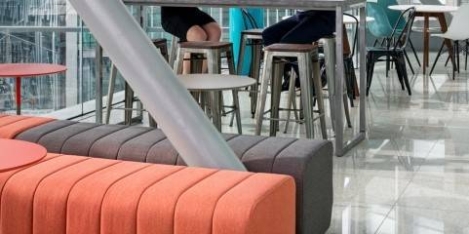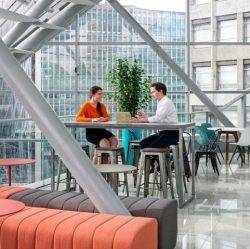October 27, 2017
HR Directors turning their attention to workplace design and experience
 The role of HR Directors is going to change in the future as they will increasingly become “curators” of the office, charged with generating the right atmosphere to inspire millennial workers, according to a study of 100 HR Directors by Unispace. The study claims found that there will be greater HR ownership of the physical workplace in the future as human resources becomes more focused on the employee “experience”. A key to future success will be ensuring workers are “engaged with the workplace” and enable them to collaborate in better ways and become more productive. A recurring theme identified during the interviews was a change to the overall decision-making process around physical space. Previously the remit of property and facilities management, it now includes HR representation as standard practice in large organisations. Bringing HR to the table enables the working environment to embody organisational values and contribute towards achieving strategic “people-led” business objectives, such as better staff retention and productivity.
The role of HR Directors is going to change in the future as they will increasingly become “curators” of the office, charged with generating the right atmosphere to inspire millennial workers, according to a study of 100 HR Directors by Unispace. The study claims found that there will be greater HR ownership of the physical workplace in the future as human resources becomes more focused on the employee “experience”. A key to future success will be ensuring workers are “engaged with the workplace” and enable them to collaborate in better ways and become more productive. A recurring theme identified during the interviews was a change to the overall decision-making process around physical space. Previously the remit of property and facilities management, it now includes HR representation as standard practice in large organisations. Bringing HR to the table enables the working environment to embody organisational values and contribute towards achieving strategic “people-led” business objectives, such as better staff retention and productivity.






 Businesses are concerned about the pace of commitment to improving the UK’s infrastructure, and a record number of firms are dissatisfied with the state of infrastructure in their region. With the UK currently ranking 27th in the world for the quality of its infrastructure, nearly all (96 percent) of businesses in the 2017 CBI/AECOM Infrastructure Survey see infrastructure as important (of which 55 percent view it as critical) to the Government’s agenda. From the Clean Growth Strategy and the £500 billion infrastructure pipeline to its decision to build a new runway at Heathrow and press ahead with the A303 tunnel, the Government has made clear its commitment to British infrastructure. However, only one in five firms is satisfied with the pace of delivery (20 percent) and almost three quarters (74 percent) doubt infrastructure will improve over this Parliament. This lack of confidence is attributed primarily to policy inconsistency (+94 percent of firms) & political risk (+86 percent). The digital sector is the exception, however, where 59 percent of firms are confident of improvements.
Businesses are concerned about the pace of commitment to improving the UK’s infrastructure, and a record number of firms are dissatisfied with the state of infrastructure in their region. With the UK currently ranking 27th in the world for the quality of its infrastructure, nearly all (96 percent) of businesses in the 2017 CBI/AECOM Infrastructure Survey see infrastructure as important (of which 55 percent view it as critical) to the Government’s agenda. From the Clean Growth Strategy and the £500 billion infrastructure pipeline to its decision to build a new runway at Heathrow and press ahead with the A303 tunnel, the Government has made clear its commitment to British infrastructure. However, only one in five firms is satisfied with the pace of delivery (20 percent) and almost three quarters (74 percent) doubt infrastructure will improve over this Parliament. This lack of confidence is attributed primarily to policy inconsistency (+94 percent of firms) & political risk (+86 percent). The digital sector is the exception, however, where 59 percent of firms are confident of improvements.




 The majority (94 percent) of workers are open to flexible ways of working such as part-time, freelance, contract, temporary or independent contract work a new report from ManpowerGroup has revealed. Coining the trend as NextGen work, the research suggests this approach to a job is a choice (81 percent) not a last resort (19 percent). Findings from #GigResponsibly: The Rise of NextGen Work – a global survey of 9,500 people in 12 countries – identifies a shift towards this new way of getting work done, and that it works for people and employers. People were asked how they want to work, what motivates them and their views on NextGen Work. More control over their schedule (42 percent), boosting their bank account (41 percent) and developing new skills (38 percent) are top reasons why this flexible kind of work is on the rise. The report also found that this flexible approach is not just attractive to Millennials, as meaningful work and employer appreciation are valued more by Boomers than any other generation. More than 80 percent of US workers say NextGen Work is a choice, not a last resort, and builds resilience for less predictable futures.
The majority (94 percent) of workers are open to flexible ways of working such as part-time, freelance, contract, temporary or independent contract work a new report from ManpowerGroup has revealed. Coining the trend as NextGen work, the research suggests this approach to a job is a choice (81 percent) not a last resort (19 percent). Findings from #GigResponsibly: The Rise of NextGen Work – a global survey of 9,500 people in 12 countries – identifies a shift towards this new way of getting work done, and that it works for people and employers. People were asked how they want to work, what motivates them and their views on NextGen Work. More control over their schedule (42 percent), boosting their bank account (41 percent) and developing new skills (38 percent) are top reasons why this flexible kind of work is on the rise. The report also found that this flexible approach is not just attractive to Millennials, as meaningful work and employer appreciation are valued more by Boomers than any other generation. More than 80 percent of US workers say NextGen Work is a choice, not a last resort, and builds resilience for less predictable futures.

 With a plethora of reports around that generalise the behaviour of an entire generation of people, yet another exploration of the Millennial has to be approached with caution. But for this latest study, “The Millennial mindset: Work styles and aspirations of the most misunderstood worker”,
With a plethora of reports around that generalise the behaviour of an entire generation of people, yet another exploration of the Millennial has to be approached with caution. But for this latest study, “The Millennial mindset: Work styles and aspirations of the most misunderstood worker”, 
 UK workers are still uncomfortable about having honest conversations at work, with nearly two thirds (61 percent) feel they keep an aspect of their lives hidden in the workplace. The research from Inclusive Employers found family difficulties (46 percent) was the most likely hidden issue at work, followed by mental health (31 percent). One in five also admitted they would hide their sexual orientation while at work. It also found a generational divide, with 67 percent of employees aged between 18 -24 years old keeping something secret compared to 55 percent of those over aged 55 years or over. The data, released to mark National Inclusion Week 2017, found this lack of openness can have negative impacts on workers and employers, with over a quarter of workers (26 percent) admitting they would feel less connected to their workplace if they hid an aspect of themselves and 18 percent saying their performance would suffer.
UK workers are still uncomfortable about having honest conversations at work, with nearly two thirds (61 percent) feel they keep an aspect of their lives hidden in the workplace. The research from Inclusive Employers found family difficulties (46 percent) was the most likely hidden issue at work, followed by mental health (31 percent). One in five also admitted they would hide their sexual orientation while at work. It also found a generational divide, with 67 percent of employees aged between 18 -24 years old keeping something secret compared to 55 percent of those over aged 55 years or over. The data, released to mark National Inclusion Week 2017, found this lack of openness can have negative impacts on workers and employers, with over a quarter of workers (26 percent) admitting they would feel less connected to their workplace if they hid an aspect of themselves and 18 percent saying their performance would suffer.














October 19, 2017
How our smartphones stop us from living in the moment
by Joelle Renstrom • Comment, Technology, Wellbeing
More →